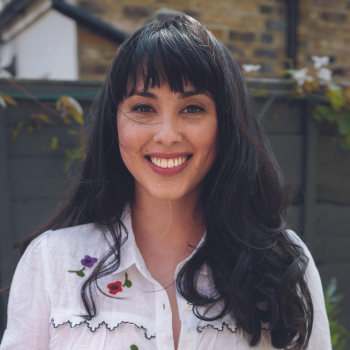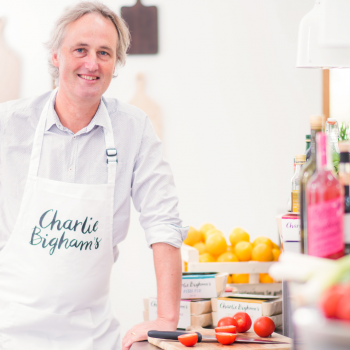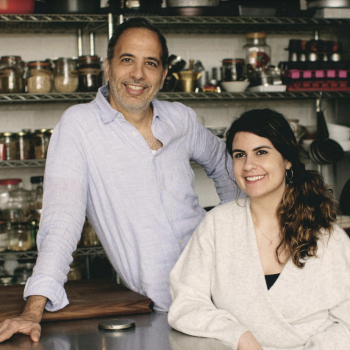Amelia Freer on lockdown, lettuce and life

 Amelia Freer (FdSc, Dip ION) is one of the UK’s leading Nutritional Therapists and healthy eating experts. She is also an internationally best selling author with her fourth book, Simply Good For You, recently released.
Amelia Freer (FdSc, Dip ION) is one of the UK’s leading Nutritional Therapists and healthy eating experts. She is also an internationally best selling author with her fourth book, Simply Good For You, recently released.
We catch up with Amelia who sheds light on her nutrition philosophy and shares her expert advice…
How did you get into nutrition?
In my late twenties, I found myself suffering from a wide range of symptoms. After trying various different treatments with limited success, my flatmate at the time suggested it might be worth looking at my diet. I eventually went to see a nutritionist and rapidly began to feel and see the results of some simple dietary changes. It sparked a passion for understanding how the food we eat interacts with our physiology and psychology. Soon after, I quit my job and spent 4 years training in Nutritional Therapy. I have been practicing and learning ever since (which is now almost 15 years).
Do you have a go-to recipe you use often?
I must make a roast chicken every week, yet never seem to tire of it. I almost always do it with a big tray of roasted seasonal vegetables and some sort of greens. It makes the best leftovers too – just adding a handful of salad and some vinaigrette – so lunch the next day can be ready in minutes.
 What are you growing in your vegetable garden at the moment?
What are you growing in your vegetable garden at the moment?
At the beginning of lockdown, I focussed my efforts on growing abundant fruit and vegetables for the year. It was as much for my mental health (I have always found being in the garden a brilliant way of unwinding) as it was for our kitchen. We have tomatoes, peppers, aubergines, cucumbers and chillis in the greenhouse and lots of beans, beetroots, carrots, greens, salads, herbs, pumpkins and squashes, leeks, kales and cabbages, apples, plums, raspberries, blueberries, strawberries and rhubarb in the garden beds. We are hoping to be pretty self-sufficient over the summer months and I will then do a lot of batch cooking and freezing to preserve our produce for the winter and spring.
Do you have a favourite super food (ingredient) which you frequently use?
I don’t believe in super foods – all foods are important in different contexts. Overall nutritional balance is what matters most and although precisely what that means will vary considerably between individuals, there are general principles that are common to most of us. Things like eating a variety of colourful fruits and vegetables, including some healthy fats in our diet, choosing minimally processed carbohydrates and having a portion of protein at each meal are all such examples.
What is the most important lesson when it comes to food?
To be curious and playful with it.
There is often a lot of rigidity and black-or-white thinking when it comes to food, especially healthy food. Foods are labelled ‘good’ or ‘bad’, we are ‘on a diet’ or ‘off a diet’, ‘being healthy’ or ‘being naughty’. Yet this is all a bit of a false dichotomy. We exist in shades of grey, and all foods have their place in sensible moderation. So instead, developing a sense of playfulness, using trial-and-error to see which foods, in which quantities, work best for our lives and our bodies, and searching for the joyfulness that can be found in healthy living, are all lessons that are often overlooked.
 What are your tips for cooking in lockdown?
What are your tips for cooking in lockdown?
Let go of any ideas of perfection. Foster an attitude of ‘good enough’ when it comes to both nutrition and cooking during these challenging times.
- Have a go at meal planning. It’s well worth investing a few minutes each week to do a rough plan of the meals you want to cook. It honestly saves so much stress and hassle later in the week.
- Dig out your old recipe books or browse the internet for a few new dishes to create. Pinterest is great for this. It definitely helps to spark the imagination.
- Batch cook. Many of us aren’t used to having to cook three meals a day, every day and are finding it all a bit of a slog. So don’t! Cook once and eat twice, by making enough for leftovers. Either enjoy them the next day, or freeze in portions for a later date.
Take a look at my article for more tips on cooking in lockdown here
What couldn’t you live without in your kitchen?
In terms of ingredients, I love olive oil, lemons, chilli and fresh herbs. And for equipment, I use my microplane at most meals, I love my old wooden chopping board, speedy peeler and selection of super-sharp kitchen knives. Vegetable prep is the basis of every meal at our house, so these pieces of kit are essential. My biggest luxury is my Le Creuset cast iron shallow pan which I use every single day and it has lasted for years.
 How long does it take to turn around your eating habits and feel the benefit?
How long does it take to turn around your eating habits and feel the benefit?
It will obviously depend a lot on your current situation, but in certain instances, it can be very fast, with some clients feeling a difference within just a couple of days.
I’d say, however, that most people take at least a couple of weeks to a month to really feel a noticeable difference from changing their diet. The key to lasting success is then sticking to those changes. For long-term results, I generally recommend allowing yourself at least a year. I know that this may sound a lot of time, but sustainable lifestyle changes are hard work and require many new habits to be formed. That takes time and I’d much prefer to go slowly, making changes that will last forever, than to suggest people make radical about-turns in their lifestyle that only last a few weeks. Health and wellbeing is not a race.
How important is your gut health?
Clearly, we want all systems of our body to be working effectively for overall health, but gut health is particularly important when it comes to nutrition, as it is necessary for the appropriate digestion and absorption of nutrients.
What does clean eating mean?
‘Clean eating’ was a phrase initially used to describe a desire to reduce the amount of highly refined and processed foods we consume and to instead increase our intake of unprocessed wholefoods. However, this relatively uncontroversial idea evolved over time into a rather more faddy term, that often encouraged exclusion of large food groups, extreme diets or expensive “super” foods or powders.
These rules that developed around ‘clean’ eating (itself a label that suggests other foods are therefore ‘dirty’) can lead to elevated anxiety or stress around food. Clearly, that is not helpful. We must remember that we eat as much for our social and emotional health as we do for our physical health. It is therefore not a term that I use and although I do agree with the principle of basing our diets on plentiful wholefoods, there is space within a healthy diet for all foods. We don’t need to make value judgements – foods are just foods, after all.
We must remember that we eat as much for our social and emotional health as we do for our physical health.
Tell us about your latest book, Simply Good for You:
Simply Good For You is a collection of family recipes that I’ve been making over the past couple of years. Since becoming a mother, I haven’t had anywhere near as much time to cook as I might have done previously. While I now need food to be on the table fast, I still want to make it healthy and nutritious – because I know how important eating well is for our wellbeing – and importantly, it also needs to taste good. I basically want it all!
I thought I probably wouldn’t be alone in wanting this, so eventually wrote it all down and put the recipes together into this book. It really is what we eat day-in, day-out and I have been so delighted to hear how Simply is also becoming a firm culinary friend to so many other busy people too.
 What will we learn at your 3-day retreat at Lime Wood?
What will we learn at your 3-day retreat at Lime Wood?
The retreat is going to be a truly immersive, holistic experience. My team and I have spent the best part of a year putting it together and we are incredibly excited to welcome our first guests after lockdown for a very well-deserved break.
We will be taking a really broad view of wellbeing – looking beyond nutrition – and encouraging guests to think deeply about what is important for them. From yoga and meditation to forest walks, cooking demos, massage and plenty of small-group workshops, there’s a packed programme of activities. But it’s all optional, so if guests need to just switch off and rest, that’s completely fine too. Lime Wood is just the most gloriously comfortable and spoiling location, and I couldn’t think of a better way to spend a few days re-fuelling and recovering after such a challenging and stressful few months.
I also run a programme of day-long or lunchtime workshops at Lime Wood throughout the year, covering all sorts of other topics, including Healthy Cooking for Kids and Eating for Health and Weight Loss. More info is available here
Motto for life?
If in doubt, just be kind.
Simply Good For You by Amelia Freer is out now (Michael Joseph, £22)
ALL PHOTOGRAPHY (C) SUSAN BELL
Amelia fervently believes that we can all achieve improved health and well-being by electing to eat the right foods. A well nourished body is stronger and more resilient and better able to face the challenges of modern day life and it need not be complicated. Keeping it simple is key. Good nutrition is, first and foremost, a celebration of food.
 Please wait while we create your listing....
Please wait while we create your listing....






